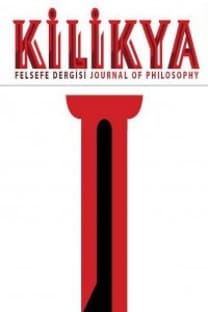Ethical Life in Kierkegaard and Williams
A discussion of how the criticisms of ethical theory in Søren Kierkegaard and Bernard Williams both reinforce each other and also provide some challenges to each other. Despite Williams’ brief and dismissive encounter with Kierkegaard around the reading of a ancient tragedy, both oppose any tendency to see the characters in those tragedies as lacking in agency. Both are consistently concerned with how the individual struggles for some ethical agency and how no individual can be free of the influence of chance or error. Kierkegaard and Willliams are shown to both oppose relativism and communitarianism in ethics, along with utilitarianism and to both have an interest in plurality of ethical ideas of how to live.
Anahtar Kelimeler:
Individuality, agency, communal, luck, tragedy
Ethical Life in Kierkegaard and Williams
A discussion of how the criticisms of ethical theory in Søren Kierkegaard and Bernard Williams both reinforce each other and also provide some challenges to each other. Despite Williams’ brief and dismissive encounter with Kierkegaard around the reading of a ancient tragedy, both oppose any tendency to see the characters in those tragedies as lacking in agency. Both are consistently concerned with how the individual struggles for some ethical agency and how no individual can be free of the influence of chance or error. Kierkegaard and Willliams are shown to both oppose relativism and communitarianism in ethics, along with utilitarianism and to both have an interest in plurality of ethical ideas of how to live.
Keywords:
Individuality, agency, communal, luck, tragedy,
___
- Butler, Judith (2000). Antigone’s Claim: Kinship Between Life and Death. New York NY: Columbia University Press.
- Evans, C. Stephen (2004). Kierkegaard’s Ethic of Love: Divine Commands and Moral Obligations. Oxford: Oxford University Press.
- Davenport, John J. and Anthony Rudd (Eds.) (2001). Kierkegaard After MacIntryre. Peru IL: Open Court/Carus.
- Foucault, Michel (2011). The Courage of Truth. (Graham Burchell, trans). Basingstoke: Palgrave Macmillan.
- Fremstedal, Rone (2014). Kierkegaard and Kant on Radical Evil and the Highest Good: Virtue, Happiness, and the Kingdom of God. Basingstoke: Palgrave Macmillan.
- Green, Ronald Michael (1992). Kierkegaard and Kant: The Hidden Debt. Albany NY: State University of New York Press.
- Hall, Amy Laura (2002). Kierkegaard and the Treachery of Love. Cambridge: Cambridge University Press.
- Hegel, G.W.F. (1977). Phenomenology of Spirit. (A.V. Miller trans.) Oxford: Oxford University Press.
- Honig, Bonne (2008). ‘The Other is Dead: Mourning, Justice, and the Politics of Burial’. Triquarterly Review, 131, 89-111.
- Honig, Bonne (2009). ‘Antigone’s Laments, Creon’s Grief: Mourning, Membership, and the Politics of Exception’. Political Theory 37(1), 5-43.
- Honig, Bonnie (2010). ‘Antigone’s Two Laws: Greek Tragedy and the Politics of Humanism’. New Literary History, 41(1), 1-38.
- Honig, Bonnie (2011). ‘Ismene’s Forced Choice: Sacrifice and Sorority in Sophocles’ Antigone’. Arethusa, 44, 29-68.
- Hume, David (1975). Enquiries Concerning Human Understanding and Concerning The Principles of Morals. Ed. P.H. Nidditch. Oxford: Oxford University Press.
- Kant, Immanuel (1996). Religion within the boundaries of mere reason. (George di Giovanni trans.) in Allen W. Wood and George di Giovanni (Eds.) Religion and Rational Theology. Cambridge: Cambridge University Press.
- Kierkegaard, Søren (1978). Two Ages. Howard V. Hong and Edna H. Hong (Eds.). (Howard V. Hong and Edna H. Hong. trans.). Princeton NJ: Princeton University Press.
- Kierkegaard, Søren (1980). The Concept of Anxiety. Howard V. Hong and Edna H. Hong (Eds.). (Howard V. Hong and Edna H. Hong. trans.). Princeton NJ: Princeton University Press.
- Kierkegaard, Søren (1983). Fear and Trembling/Repetition. Howard V. Hong and Edna H. Hong (Eds.). (Howard V. Hong and Edna H. Hong. trans.). Princeton NJ: Princeton University Press.
- Kierkegaard, Søren (1987). Either/Or (two volumes) Howard V. Hong and Edna H. Hong (Eds.). (Howard V. Hong and Edna H. Hong. trans.). Princeton NJ: Princeton University Press.
- Kierkegaard, Søren (1988). Stages on Life’s Way. Howard V. Hong and Edna H. Hong (Eds.). (Howard V. Hong and Edna H. Hong. trans.). Princeton NJ: Princeton University Press.
- Kierkegaard, Søren (1989). The Concept of Irony/Notes on Schelling’s Berlin Lectures Howard V. Hong and Edna H. Hong (Eds.). (Howard V. Hong and Edna H. Hong. trans.). Princeton NJ: Princeton University Press.
- Kierkegaard, Søren (1989). The Concept of Irony. Howard V. Hong and Edna H. Hong (Eds.). (Howard V. Hong and Edna H. Hong. trans.). Princeton NJ: Princeton University Press.
- Kierkegaard, Søren (1992). Concluding Unscientific Postscript to Philosophical Fragments. Howard V. Hong and Edna H. Hong (Eds.). (Howard V. Hong and Edna H. Hong. trans.). Princeton NJ: Princeton University Press.
- Kierkegaard, Søren (1995). Works of Love. Howard V. Hong and Edna H. Hong (Eds.). (Howard V. Hong and Edna H. Hong. trans.). Princeton NJ: Princeton University Press.
- Manis, R. Zachary (2009). ‘Kierkegaard and divine-command theory: Replies to Quinn and Evans’. Religious Studies, 45, 289-307.
- Nozick, Robert (1974). Anarchy, State, and Utopia. Oxford: Blackwell, 1974.
- Quinn, Philip L. (1998). ‘Kierkegaard’s Christian Ethics’ in Alastair Hannay and Gordon D. Marino (eds.) The Cambridge Companion to Kierkegaard. Cambridge: Cambridge University Press.
- Schelling,F.W.J.(2006).PhilosophicalInvestigations into the Essence of Human Freedom. (Jeff Love and Johannes Schmidt trans.). Albany NY: State University of New York Press.
- Stocker, Barry (2014). Kierkegaard on Politics. Basingstoke: Palgrave Macmillan.Williams, Bernard (1972). Morality: An Introduction to Ethics. Cambridge: Cambridge University Press.
- Williams, Bernard (1981). Moral Luck: Philosophical Papers 1973-1980. Cambridge: Cambridge University Press.
- Williams, Bernard (1993a). Ethics and the Limits of Philosophy [amended edition]. London: Fontana Press [first published 1985].
- Williams, Bernard (1993b). Shame and Necessity. Berkeley CA: University of California Press.
- Yayın Aralığı: 2
- Başlangıç: 2014
- Yayıncı: Eray Yağanak
Sayıdaki Diğer Makaleler
Adalet Ölçütü Olarak İki Önemli Yaklaşım: Birincil Değerler ve Kabiliyetler
Technology and Formation: Stiegler on Event and Self-Care
Scenes of Inner Devastation: Confessional Improvisation
Moral Hermeneutics, Coherence Epistemology, and the Role of Emotion
